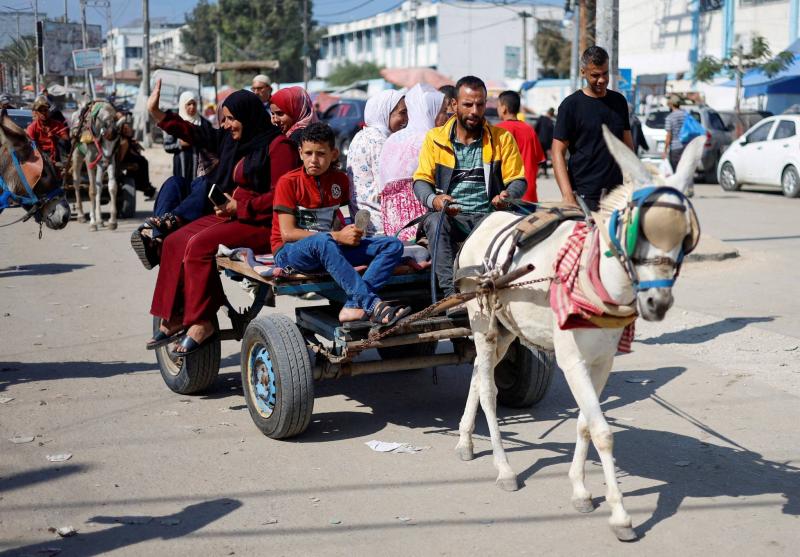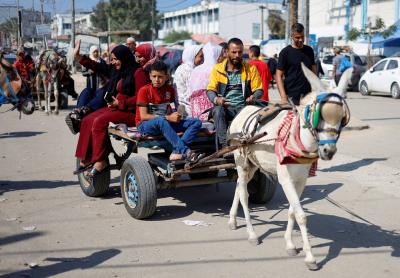Early this Wednesday morning, Palestinian rescue workers cleared debris at the site of an airstrike conducted by Israel overnight in Gaza, gradually revealing the lifeless head and arm of a person, representing the latest victims of the bombardment that has claimed thousands of lives. As the rescuers removed more rubble, the rest of the body appeared, belonging to a member of the Nasr family, whose home in Khan Younis city in the southern Gaza Strip was bombed earlier today, resulting in nine deaths, according to residents.
"Our neighbors have died," said a neighbor of the family named Iyad Al-Ataily. "Everywhere you look, you see a martyr," he added, stating that the strike woke him up at 2 a.m. before he could escape with his wife and child from their home amid thick smoke. Health authorities in the territory controlled by Hamas reported that Israel's escalating attacks have killed around 8,800 Palestinians, most due to aerial and artillery strikes like the one that hit the Nasr family's home. The army stated that although it urged civilians to move south, it would strike any Hamas target throughout the territory while taking possible precautions to mitigate damage.
The attack was a response to an assault by Hamas fighters, which Israel claimed resulted in the deaths of 1,400 people and the kidnapping of 240. The assault now includes a ground invasion expected to escalate violence further. More than half of Gaza's population is already displaced. Hospitals overwhelmed and lacking electricity and medication are refusing to admit the wounded, and grave diggers are struggling to find places to bury the dead.
In Jabalia, an Israeli strike on a refugee camp on Tuesday killed dozens, according to health authorities. Israel claimed the strike targeted a senior Hamas leader. In the morgue in Khan Younis, where the bodies of the Nasr family killed elsewhere in the city were transferred, a group of men and boys were gazing at the scene as ambulances brought in more dead. Bodies were lifted on stretchers and moved to the morgue. A small boy stood silently looking through the bars of a fence. Family members of some of the deceased were crying and chanting, "With our souls and our blood, we redeem you, martyr."
Inside, workers removed dirt and blood from the bodies before wrapping them in white shrouds for burial. When Reuters visited the morgue on Wednesday morning, there were four children among the 15 bodies inside. A doctor, who declined to be named for fear of retaliation, said, "Every day there are fatalities, and every day among them are children or women." Israel has cut electricity, water, and fuel to Gaza, with only minimal amounts of food and medicine reaching through the Rafah crossing from Egypt. Due to a shortage of gasoline, many people are using horse-drawn carts as makeshift ambulances. In Khan Younis, Farida Abu Azm was taking her husband to the hospital for cancer treatment. She said, "This is the only means of transportation we have now."
On the roadside, cars and taxis were covered with dust. A horse cart owner named Akram Al-Qara noted that he makes regular trips from downtown Khan Younis to the hospital. He added that he charges one shekel per passenger.
Many injured cannot find a place in hospitals. The fortunate ones who find a bed must leave before they fully recover. The director of the Turkish Friendship Hospital in northern Gaza, which mostly treats cancer patients, said Wednesday that the hospital is no longer operational due to fuel shortages. Israel claims there is enough fuel in Gaza to supply hospitals, but Hamas is using it for military purposes.
In a shelter for displaced persons at a United Nations school in Khan Younis, Salwa Al-Najjar stood beside her son Majid's bed, wiping his face. She said he cannot move his head after being injured in the Israeli bombardment while he and his brother were tending to the family's small flock of sheep. Majid's brother was killed, and she screamed upon receiving the news. A cousin had transported them to the Red Crescent Hospital in Khan Younis, the largest city in the southern part of the enclave, but hospital staff informed them there was no room available.
Salwa Al-Najjar, her face swollen from crying, asked, "Where do people go?" In the classroom where Majid lies, which has turned into a temporary hospital wing for the injured, patients lay on beds, but without proper medical assistance. At Nasser Hospital, director Nahed Abu Temeen said they are refusing to admit injured patients, even those needing urgent medical intervention. He added, "Gaza's hospitals are filled with injured individuals occupying hospital beds." He continued, stating that patients requiring advanced surgical procedures "cannot be helped here."




